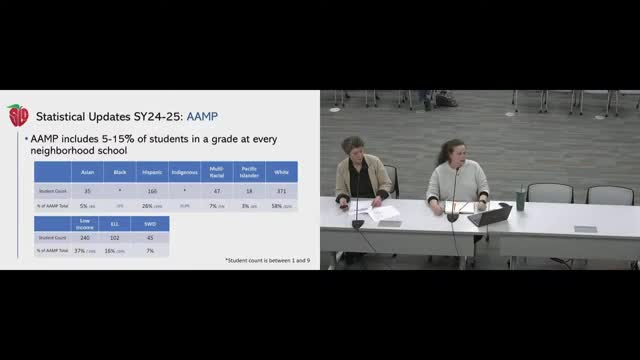Irving School District leaders discuss magnet program changes and student equity efforts
February 08, 2025 | Salt Lake School District , Utah School Boards, Utah
This article was created by AI summarizing key points discussed. AI makes mistakes, so for full details and context, please refer to the video of the full meeting. Please report any errors so we can fix them. Report an error »

The Salt Lake City School District (SLCSD) Board Meeting on January 21, 2025, highlighted significant discussions surrounding the district's efforts to improve educational equity and inclusion, particularly in magnet and enrichment programs. The meeting underscored the district's commitment to addressing disparities in student representation and ensuring that all students, regardless of background, have access to quality educational opportunities.
A key focus of the meeting was the ongoing collaboration between the special education department and the broader educational staff to enhance inclusion practices. Board members expressed appreciation for the efforts made by educators to critically examine their roles in supporting students with diverse needs. This collaborative approach aims to foster an environment where all students are recognized and valued, with an emphasis on understanding individual strengths and challenges.
Concerns were raised regarding the low enrollment numbers of Black, Indigenous, and other underrepresented communities in magnet programs. Board members questioned the effectiveness of current outreach strategies and whether new methods were being implemented to engage these communities. The district acknowledged the need for improved communication and proactive recruitment efforts to ensure that families are aware of available programs and feel encouraged to enroll their children.
The meeting also addressed the financial implications of magnet programs, with discussions about the per-pupil spending differences between magnet and neighborhood classrooms. Some board members expressed concern over the $2,000 higher investment per student in magnet programs, questioning whether this disparity was justified and how it could be addressed to promote equitable funding across all educational settings.
In response to these discussions, the district outlined plans to refine its identification processes for magnet programs, aiming to ensure that students are selected based on merit while also considering the need for equitable representation. The board emphasized the importance of ongoing evaluation and adjustment of these programs to better serve the community's diverse student population.
As the meeting concluded, board members expressed a desire for further study sessions to delve deeper into these issues, indicating a commitment to continuous improvement in the district's educational offerings. The discussions reflect a broader recognition of the challenges faced by the district in achieving equitable educational outcomes and the importance of collaborative efforts to address these challenges moving forward.
A key focus of the meeting was the ongoing collaboration between the special education department and the broader educational staff to enhance inclusion practices. Board members expressed appreciation for the efforts made by educators to critically examine their roles in supporting students with diverse needs. This collaborative approach aims to foster an environment where all students are recognized and valued, with an emphasis on understanding individual strengths and challenges.
Concerns were raised regarding the low enrollment numbers of Black, Indigenous, and other underrepresented communities in magnet programs. Board members questioned the effectiveness of current outreach strategies and whether new methods were being implemented to engage these communities. The district acknowledged the need for improved communication and proactive recruitment efforts to ensure that families are aware of available programs and feel encouraged to enroll their children.
The meeting also addressed the financial implications of magnet programs, with discussions about the per-pupil spending differences between magnet and neighborhood classrooms. Some board members expressed concern over the $2,000 higher investment per student in magnet programs, questioning whether this disparity was justified and how it could be addressed to promote equitable funding across all educational settings.
In response to these discussions, the district outlined plans to refine its identification processes for magnet programs, aiming to ensure that students are selected based on merit while also considering the need for equitable representation. The board emphasized the importance of ongoing evaluation and adjustment of these programs to better serve the community's diverse student population.
As the meeting concluded, board members expressed a desire for further study sessions to delve deeper into these issues, indicating a commitment to continuous improvement in the district's educational offerings. The discussions reflect a broader recognition of the challenges faced by the district in achieving equitable educational outcomes and the importance of collaborative efforts to address these challenges moving forward.
View full meeting
This article is based on a recent meeting—watch the full video and explore the complete transcript for deeper insights into the discussion.
View full meeting

